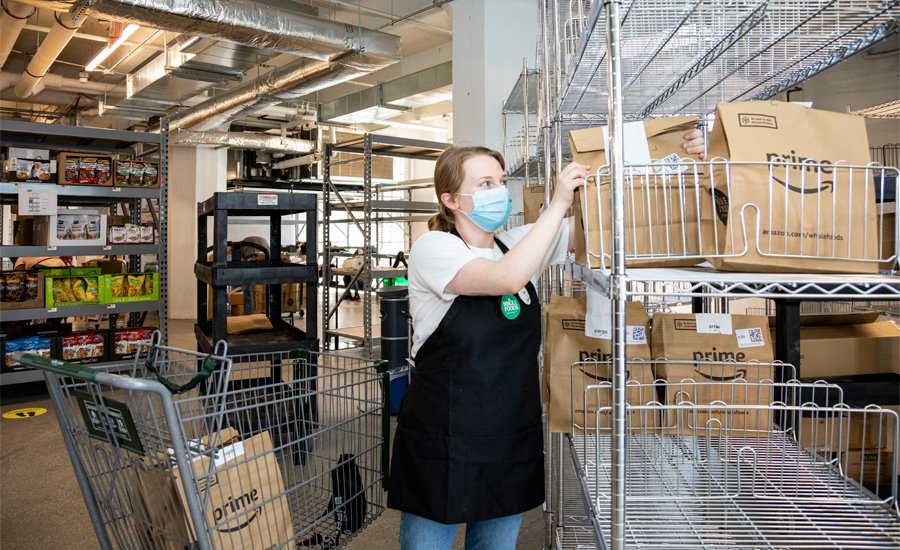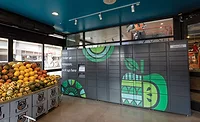Channel Strategies
Dedicated shoppers keep natural and organic channel afloat
eCommerce options add more convenience for shoppers

Experts note that shopping can be easier for consumers in the natural and organic channel because these specialty retailers offer a specially curated selection of products that meet shoppers’ needs.
(Image courtesy of Sprouts Farmers Market Inc.)
Natural and organic retailers always have been good about connecting with their core audience. “Naturally focused retailers are well positioned to be able to respond to their shoppers’ needs for proactive health and wellness products, particularly with their focus on identifying and supporting small, local and unique brands,” explains Jeff Crumpton, senior manager of retail reporting at Chicago-based SPINS LLC. This has helped natural and organic retailers sustain growth, at least for the most part.
Yet, 2020 was a bit of a mixed bag for the natural and organic retail channel. At the start of the year, Lucky’s Market, Niwot, Colo., filed for bankruptcy and started reducing its store count a few weeks after Kroger Co., its Cincinnati-based majority owner, divested its shares of the natural and organic retailer. Just days after the Lucky’s Market announcement, Asheville, N.C.-based Earth Fare announced it was going out of business. Some market analysts cautioned that the days of natural and organic retailers could be numbered because larger grocery chains offer a growing variety of natural and organic products also, often at a lower price point.
Of consumers who purchase natural and organic products, 59% buy them from traditional supermarkets, 37% buy them from mass merchandisers, and only 34% buy them from natural and organic retailers, explains Karen Formanski, health and nutrition analyst at Chicago-based Mintel. “This reflects the fact that the market has shifted greatly from the era when health-conscious shoppers had limited options for finding what they need.”

Image courtesy of Whole Foods Market
Still, the early stages of the pandemic brought unprecedented growth to these and other retailers as consumers flocked to stores to stock up on a variety of goods, and although natural and organic retailers typically attract a more niche audience, the pandemic brought an even larger consumer base into the store.
“As the pandemic moved through 2020, this prioritization of health and wellness as part of a shopper’s diet saw these retailers become the destination for existing and new shoppers,” SPINS’ Crumpton explains.
Amid this rebound, Earth Fare was acquired by Hulsing Enterprises LLC, Prairie Village, Kansas. Together with Earth Fare Founder Randy Talley and former president Mike Cianciarulo, Hulsing Enterprises revived the natural and organic chain in summer 2020. Since then, the chain has reopened 21 locations across eight states and plans to open six more before the end of the year.
“Our original plan was to open eight Earth Fare locations,” Mike Cianciarulo, Earth Fare’s president wrote on the company’s LinkedIn page in June 2021. “However, after an overwhelming response from the public, we knew we had to do more. Our team quickly realized how much Earth Fare was missed and we understood the importance of bringing healthy options back to as many communities as possible.”
Market activity in this channel has been a bit quieter in 2021 compared with 2020. By March 2021, year-over-year (YOY) sales flattened to only 3% growth, SPINS’ Crumpton reports. The unusual shopping activity spurred by the pandemic created a bit of a data fluke that makes 2021 seem less successful in terms of retail sales. However, that is not necessarily the case. To understand the bigger picture, analysts are looking at store performance on a two-year cycle, which shows 18% growth for the channel compared with 2019. In addition, natural and organic retailers grew more in the period than other retail channels, Crumpton says.
Individual stores are holding up this data trend too. In performance results for its second quarter of 2021, which ended July 4, Sprouts Farmers Market Inc., Phoenix, reported a 7% sales decrease compared with the same period in 2020 but a 7% increase compared with 2019. The growth is attributed to the opening of new stores. The healthy grocer plans to open 20 new stores this year. Similarly, Natural Grocers by Vitamin Cottage Inc., Lakewood, Colo., reported that its daily average comparable store sales decreased 3.6% in the third quarter of its fiscal year 2021, which ended June 30, compared with the prior year. On a two-year stacked basis, daily average comparable store sales increased 11.9%, it reports.
Despite more shopping options for natural and organic products, some shoppers are staying loyal to the natural and organic channel. Mintel’s Formanski points out that this channel makes natural and organic shopping easier for consumers because the specialty retailers offer a specially curated selection of products that meet shoppers’ needs. Shoppers also don’t have to hunt through a large selection of products to find ones that align with their nutritional and ethical values.
A 2021 survey by The Harris Poll on behalf of Whole Foods Market, Austin, Texas, found that parents of kids younger than age 18 spend an average of 27.2 minutes a week, or 24 hours a year, reading food labels and thinking about the ingredients in their children’s food. Nearly 70% of surveyed consumers said they worry less about these ingredients when shopping at a grocer or retailer that they know has high ingredient standards.
Furthermore, Formanski reports that natural ingredients label claims are the third-highest motivating claim for product purchases overall.
To help consumers find products that meet their ethical expectations, Whole Foods Market launched its Sourced for Good product seal earlier this year. Products that bear this seal are third-party certified for supporting responsible sourcing. The program is intended to help provide tangible improvements in farmworkers’ lives in order to strengthen worker communities and promote environmental stewardship. At the seal’s launch in April, more than 100 products in Whole Foods Market stores were Sourced for Good certified.
Success matches shifting shopping habits
In addition to new product seals, several other label claims have been resonating with natural and organic shoppers. SPINS’ Crumpton reports that dollar sales of Certified Paleo, Certified Paleo Keto and Paleo Positioned products are up 15%, 12% and 10%, respectively, in the year ending Aug. 8. Certified Fair Trade is the top label claim of interest, with related product dollar sales up 27%. In addition, sales of foods with plant-based claims grew 4% in the period.
Frozen foods also were a bright spot for this retail channel. “Time-starved shoppers turn to the frozen aisle for the convenience of meal prep or pre-made products while they juggle at-home work, schooling and the limitations placed on the restaurant sector by rising COVID-19 cases,” Crumpton explains.
Similarly, the alcohol departments of natural and organic retailers have been performing exceptionally well as consumers purchase their alcohol beverages from here instead of bars and restaurants, he adds.
For non-alcohol beverages in the channel, shelf-stable functional beverages earned the highest YOY dollar sales growth rate at 16.4%, Crumpton reports. This growth was fueled by continued innovation in the category, including products containing nootropics, isotonic sports beverages with coconut, and energy drinks with added functional ingredients. Following closely were refrigerated teas and coffees at 15% sales growth, carbonated soft drinks at 13% growth, and shelf-stable teas and ready-to-drink (RTD) coffees at 11% growth, respectively.
This growth in tea and coffee beverages demonstrates that shoppers are returning to their pre-pandemic routines and grabbing convenient but better-for-you products, Crumpton notes. Furthermore, more RTD coffee products are including plant-based dairy alternatives in their ingredient lists, which aligns with the overall interest in plant-based products.
Curating convenience
One notable shopping shift that occurred during the pandemic and is likely to continue in the years beyond is the shift to eCommerce grocery shopping for safer and more convenient purchasing options.
“As the pandemic and its effect were amplified throughout 2020, larger national and big-box retailers pivoted into online ordering, curbside pickup and partnerships with third-party delivery services,” SPINS’ Crumpton says. “eCommerce retailers and platforms also grabbed a greater share of the market from these natural enhanced and other regional grocery retailers.”
To stay competitive, some natural and organic retailers are expanding their eCommerce services. Channel leader Whole Foods Market has been offering grocery delivery and curbside pickup in select areas since early 2018, shortly after it was acquired by Seattle-based Amazon in 2017. Since then, grocery delivery has expanded to free two-hour grocery delivery in more than 2,000 cities and towns across the country, although the company now is testing delivery fees in some areas to cover the rising costs of grocery delivery. Last year, the chain also started offering Amazon Prime members free grocery pickup within one-hour arrival time windows for orders of $35 or more.
In further acknowledgement of the eCommerce trend in grocery, Whole Foods Market opened its first-ever permanent online-only store in New York City in September 2020. The Industry City store is fully staffed by Whole Foods Market team members who receive, shop and prepare orders for delivery to consumers in the Brooklyn area. The company says this new delivery-only retail model will allow the retailer to serve even more consumers and continue to meet the growing demand for grocery delivery.
For those natural and organic retailers that have not yet implemented some kind of eCommerce interface, the time to invest and implement is now, Crumpton says.
“Over the course of the last year, eCommerce has developed by light-years to support a retail landscape where the safety and convenience of shoppers is now commonplace,” he points out. “Developing and deploying your own eCommerce solution is critical to winning and keeping existing and new shoppers.”
Crumpton adds that the eco-conscious, health-minded, socially aware and animal welfare-concerned shoppers that frequent natural and organic retailers also are digitally savvy. Therefore, they expect the convenience of eCommerce shopping to not only go up for regular groceries, but that online shoppers also will discover new products that align with their values.
Looking for a reprint of this article?
From high-res PDFs to custom plaques, order your copy today!



